Commencing any project build with a rust-free classic is always desirable because it can instantly wipe thousands of dollars from the required budget. That is the opportunity awaiting the new owner of this 1959 Jaguar Mark 1. Life in a dry climate has left it rock-solid, making its restoration seem relatively straightforward. It retains what appears to be its original engine, which would provide surprising performance from a car renowned more for its luxury than its muscle credentials. I must say a big thank you to Barn Finder T.J. for spotting this wonderful British classic.
The Jaguar Mark 1 enjoyed a relatively short production run, remaining on sale from 1955 until 1959. It achieved respectable sales, with 37,397 buyers taking one home. Our feature car is a final-year example, and it seems fitting that the first owner chose British Racing Green to cloak its exterior. The paint shows age, and there are minor panel imperfections. However, it has apparently spent its life in its current location, making its rust-free status unsurprising and very welcome. That should mean that addressing its shortcomings should be straightforward, making the Jag ideal for a rookie or someone preferring the DIY approach. The glass looks crystal clear, and most trim pieces would present acceptably following a careful polish. The car’s crowning glory is the wire wheels, which appear in good order.
The news isn’t quite as favorable when we examine this Jaguar’s interior. It is serviceable and would present significantly better with a deep clean, but it begs for attention. The leather on the front seats looks slightly tired, and I am unsure whether deep conditioning would bring them back from the brink. The rear seat looks okay, but the front door trims look baggy. Removal and careful stretching and gluing might resolve the issue, and I would choose that approach before considering a retrim. The driver’s armrest is missing, and the carpet requires deep cleaning or replacement. However, the big ticket item inside any Jag of this vintage is the timber trim, which can be expensive to replace if it has deteriorated significantly. There are no such visible problems, which will wipe a few welcome additional dollars from this restoration.
Jaguar initially introduced the Mark 1 powered by a 2.4-liter six, but pressure from its largest market in North America motivated it to slot the beautiful 3.4-liter DOHC six under the hood in 1957. Another significant change occurred when buyers could order their Mark 1 with a three-speed automatic transmission at the end of that year. The 2.4 produced 112hp and 141 ft/lbs of torque. The impact of the larger motor was profound, with those figures climbing to 210hp and 213 ft/lbs. The auto stifled outright performance, although this car’s ability to cover the ¼-mile in 17.3 seconds was considered impressive during this period for a vehicle with what many viewed as a reasonably modest engine. This Jag doesn’t run or drive, and the seller hasn’t attempted to coax it to life. That is probably good news because many powerplants have suffered significant damage when a well-intentioned owner tries to get it running. The car also has no brakes, leaving the buyer with another task to tackle. What is worth considering is this classic’s rust-free status and serviceable interior. That could make addressing its mechanical shortcomings an achievable short-term goal, allowing time for the new owner to enjoy some classic motoring as they assemble the budget for the cosmetic refresh.
This 1959 Jaguar Mark 1 is a solid British classic wearing the most iconic paint color. Its solid nature means a mechanical revival would allow the new owner to enjoy the car in the short term while planning its cosmetic restoration. The seller has listed it here on Craigslist in Walnut Creek, California, for $9,900. That makes it pretty affordable for a classic of this caliber, but is that enough to tempt you to pursue it further?
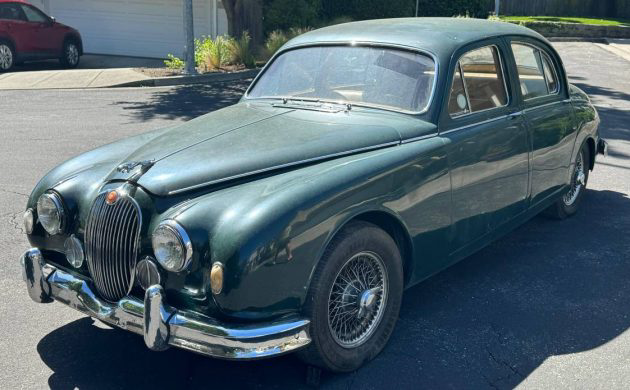
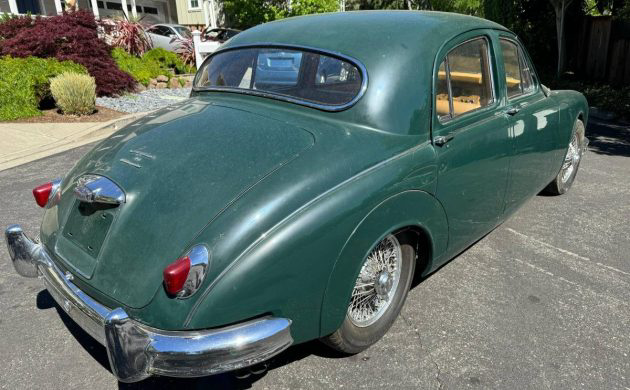
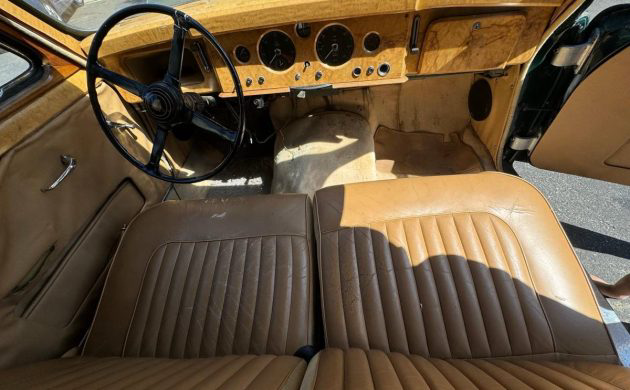
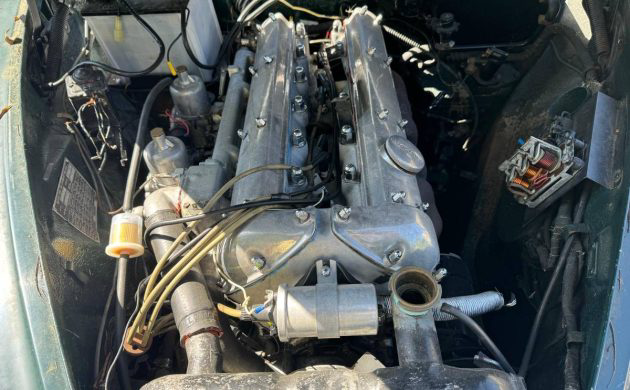
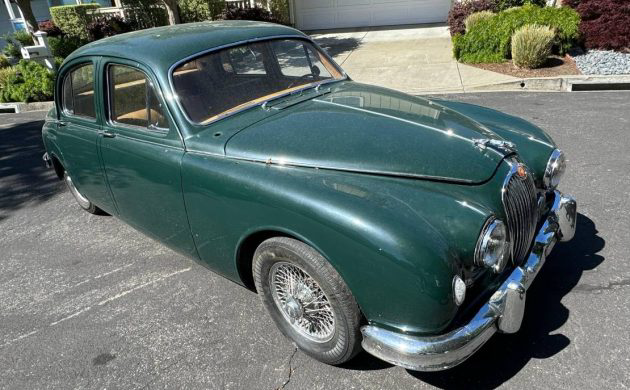




An old high school friend’s dad had one of these in the late 60’s and I loved the looks and the way it drove. A very classic Jag. My only beef was the automatic trans. I prefer a stick and I am not sure if this car in America was ever brought over with a manual trans. Can someone help me out here? I would be interested in one if I found a stick model………..
OMG! just like the car I put a 350/turbo 350 into when I was a junior in highschool! Got mine as a freebie from a friend of ours who owned a used car lot not far from our house and wanted it gone. Mine was
the victim of a wire fire that took out
most everything from behind the dash
forward. And in the Midwest in the early ’70s, there were no replacement
parts for such a car anywhere back then. We had VW, Toyota and Datsun
but nothing for British cars at that time. A friend of mine called to tell me that Rod & Custom Magazine had
an article on swapping a 350 into a
Jaguar. So I hot footed it down to the
Kroger’s near my house and bought a
copy and began to read it. Wasn’t long before my Dad, my friends and I
were getting the car ready for the swap. First thing I did was to have it
towed to an electrical repair shop to
have the car wired to American spec
so that the defective British wiring
harness would start no more fires.
Next came the actual engine and tranny swap and the adding of a 2 pot
master cylinder for the brakes as well.
The engine and tranny came from a
smacked ’70 Impala sedan with 31K
miles before the crash. On the face of it, the swap was pretty much a
straightforward affai measuring
everything. Shoot, we even added A/C to the mix and had a great car to
boot! What I got was a cool British car that I could use every day and still
GET PARTS for it when I needed them. In all, I put $1,500 in in it all rolled and since I got the car for free,
that $2,500 profit was a sweet sweet
deal when a local doctor bought it for
$4K and then paid me an extra $500
to help his mechanic install a Chevy
drivetrain in his Grandpa’s Bentley
town car! Lots of fun bein a kid back
then.
Putting more power in a MK1 3.4 Jag would be like writing a suicide note. The cars have narrow rear track (changed for the MKII) and have a reputation for being difficult to drive fast. And if you don´t drive fast, who needs more power?
But MKI look great and the price on this is so reasonable for the apparent condition that we can hope it finds a sympathetic new owner.
When the MK 2s came out and were used in British Saloon Car racing they were soon eclipsed by the lighter “poor handling” MK1s that dominated. The drivers that used them knew how to make the rear end steer the car. I have one with a transplanted 3.8 4speed w od. Modified like it is it’s not worth much but it’s sure fun to drive. And the more mature women dig em.
The Mk 1 was brought out as a cheap version of the larger Jaguar sedans but proved so popular that they hastily redesigned it with more luxury. Most were a 4 speed manual but many had OD, an auto Mk 1 or Mk 2 is unusual to me. This looks like a very good buy with a very passable and complete interior, nice looking wires and lacking the usual tin worm. I don’t know enough about the Mk 1’s whether there was a front seat center arm, don’t think so and it doesn’t look like it.
Martin, when I put the 350 in this car,
I didn’t do it to go fast I did it for reliability’s sake. The engine I used was a mercy mild version of the 350
with a 2 barrel carb and that’s it. What I liked was the Turbo 350 tranny
that came with the engine. It was
better than the Powerglide and gave
you a third gear to make use of all
the torque the 350 was generating.
That butter smooth Turbo 350 was
the right choice for a tranny as it shifted quite smoothly and felt quite
becoming to a fine car such as this
one. If Jaguar had a setup like the one I built, they could’ve sold more
cars. The car I got was in really great
shape and complete down to the picnic basket in the trunk complete
with fine china and silverware. And
except for the scorched paint on the
fender tops and the hood, the car was
in perfect condition. A trip to the paint shop, and the whole car looked
good as new. My car also had the all
steel sunroof that cranked open on
nice days. In fact, when my Mom
drove it to work, she got all kinds of
looks as she drove into the parking lot. Must’ve been something to see.
So Martin, I built my car that way to
preserve it and keep it on the road.
There was a reason there were cottage industries that started up, putting SBC’s in Jaguars, or selling you the kits to do so.
. When I was in my Army days, one of the permanent party guys found one that looked a lot like this one out in the desert, which he bought and brought back to his place. Thing way, it apparently had sat there in the desert for a ‘long’ time. Long enough that the car body and glass looked like they’d been sandblasted. There was almost no paint or rust on the car and the glass looked like it had been frosted. Never saw how it turned out as I soon changed duty stations.